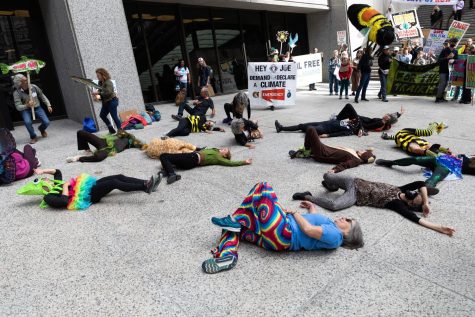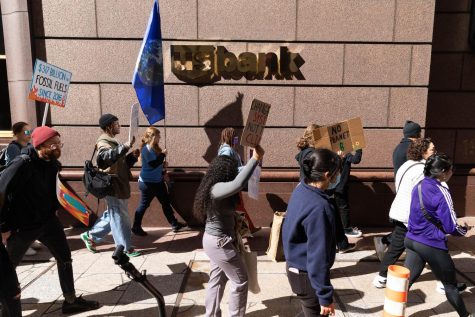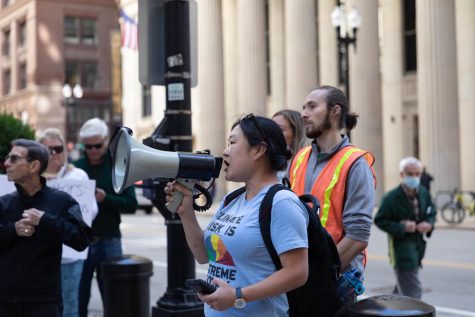Fridays for Future leads annual global climate strike
September 30, 2022
A couple hundred protesters came together in Chicago last week, marching downtown and demanding big banks divest from fossil fuel companies in the urgent fight against climate change.
Youth-led organizations Fridays for Future, Sunrise Movement Chicago, 350 Chicago and Wisconsin and more than a dozen others came together in Pritzker Park, 310 S. State St., to protest banks’ investments in the fossil fuel industries.
“Fridays for Future is actually a global movement that was started by Greta Thunberg … so globally, Fridays for Future is having a day of action today, September 23,” said Natasha Bhatia, 16, co-head of Fridays for Future Chicago and a junior at Hinsdale Central High School.
Bhatia discovered Fridays for Future when she was researching environmental groups back in April of this year and connected with Fridays for Future U.S. through Instagram.
“Fridays for Future [U.S.] has at least 100 different local groups in the United States. … They put me in contact with someone with Fridays for Future Chicago,” Bhatia said.
Bhatia estimated that around 250 people attended the protest, and she sees potential for another future climate strike.
“Since our strike, we’ve had a lot of interest in Fridays for Future Chicago and for people wanting to join our chapter, so that has been a really great impact,” Bhatia said.

Starting at Pritzker Park, the protestors marched quickly first to the U.S. Federal Reserve Bank, the Chase Tower and ended at Federal Plaza, chanting phrases like, “No coal, no oil, keep your carbon in the soil,” and, “The tides are rising, so are we.”
More than 400 strikes around the world occurred on the same day.
“We are tired of seeing disasters caused by climate change, knowing they will inevitably increase. … For it is our generation that will be forced to have to suffer the consequences of a damaged planet,” Bhatia said.
Chicago is home to a major branch of Chase Bank, and for John Greenler, executive director of 350 Wisconsin, addressing climate change goes beyond state lines.
“We have a large focus on divesting from fossil fuels, and Chase Bank is the bank that is the kind of most egregious in the terms of funding clean energy and defunding from fossil fuels,” Greenler said.
An October 2021 report by the Sierra Club called Chase “the world’s largest banker of fossil fuels, pouring more than $316 billion into the fossil fuel industry from 2016 to 2020.” At the time, JP Morgan Chase released its “Environmental and Social Policy Framework,” pledging to join the Net Zero Banking Alliance and reach net-zero emissions from its investment and lending portfolios by 2050.
Students who attended, including Elliot Obuch from Evanston Township High School and a member of Sunrise Movement Chicago, are concerned about the effects of the climate crisis.
“My grandfather was a chemist, and he realized back in the ‘60s, ‘Oh, this is going to be really, really bad,’ and so I’ve always been trained from a young age that this is a really big issue, and so it matters a lot to me because, I mean, billions of people are going to die,” Obuch said.

Obuch was wearing a flag that had the words “flood victim” written on it and believes flooding is something the Midwest could experience as a result of climate change.
“There’s a potential that the sea ends up rising to a level along Canada, and it flows down into the Great Lakes which would render [the water] undrinkable and severely raise the water level … which is a threat to Chicago,” Obuch said.
According to the Environmental Protection Agency, “Climate change is expected to intensify storms and lead to greater precipitation across the [Midwest] during this century. … Rising temperatures also diminish winter ice cover, which may leave shores more vulnerable to waves, increase erosion and flooding, and damage fish habitat and property.”
The Great Lakes contain 84% of North America’s freshwater, providing drinking water to more than 40 million people, and “drinking water quality may also decline as a result of heavier rainfall events,” as reported by the Environmental Protection Agency.
Colin Lowman, an ETHS student and a member of Sunrise Movement Chicago, thought it was important to be at the protest, despite missing school.
“I tried to get some of my friends to come here today, and a lot of them are like, ‘Nah, I can’t miss school, I have a test, I have this,’ and … I feel like this is extremely important,” Lowman said.

Lowman was originally unsure about attending.
“My buddy here [Obuch] convinced me to go. I was kind of on the fence about it … and I think if we can kind of do that for each other, then I think we can make a huge impact,” Lowman said.
Older generations also participated in the strike, including Susan Millar from Madison, Wisconsin.
“I am the grandmother of five and [attending] because I am reading the science, and I understand the crisis that we’re in, and I want my grandchildren to be able to live a full life,” Millar said.
Millar said she was puzzled that there are not more young people engaged.
“[It’s] an impression of awareness; I mean they’ve got so many other things going on in their lives, so I’m thankful for every single one of them that comes out,” Millar said.
Bhatia agreed there needs to be more youth involvement.
“I think what we need to do is tell [the] youth and work with them and tell them that they have a voice … because our voice can be very, very powerful out there,” Bhatia said.







